
Back إسكتلندا في عهد الإمبراطورية الرومانية Arabic Escòcia en temps de l'Imperi Romà Catalan Escocia durante el Imperio romano Spanish اسکاتلند در دوره امپراتوری روم Persian Écosse au temps de l'Empire romain French Storia della Scozia (I secolo-IV secolo) Italian Шотландия во времена Римской империи Russian Roma egemenliği döneminde İskoçya Turkish
| History of Scotland |
|---|
 |
|
|



Scotland during the Roman Empire refers to the protohistorical period during which the Roman Empire interacted within the area of modern Scotland. Despite sporadic attempts at conquest and government between the 1st and 4th centuries AD, most of modern Scotland, inhabited by the Caledonians and the Maeatae, was not incorporated into the Roman Empire with Roman control over the area fluctuating.
In the Roman imperial period, the area of Caledonia north of the River Forth, while the area now called England was known as Britannia, the name also given to the Roman province roughly consisting of modern England and Wales and which replaced the earlier Ancient Greek designation as Albion. Roman legions arrived in the territory of modern Scotland around AD 71, having conquered the Celtic Britons of southern Britannia over the preceding three decades. Aiming to complete the Roman conquest of Britannia, the Roman armies under Q. Petilius Cerialis and Gn. Julius Agricola campaigned against the Caledonians in the 70s and 80s. The Agricola, a biography of the Roman governor of Britannia by his son-in-law Tacitus mentions a Roman victory at "Mons Graupius" which became the namesake of the Grampian Mountains but whose identity has been questioned by modern scholarship. In 2023 a lost Roman road built by Julius Agricola was rediscovered in Drip close to Stirling: it has been described as "the most important road in Scottish history."[1][2]
Agricola then seems to have repeated an earlier Greek circumnavigation of the island by Pytheas and received submission from local tribes, establishing the Roman limes of actual control first along the Gask Ridge, and then withdrawing south of a line from the Solway Firth to the River Tyne, i.e. along the Stanegate. This border was later fortified as Hadrian's Wall. Several Roman commanders attempted to fully conquer lands north of this line, including a 2nd-century expansion that was fortified as the Antonine Wall.
The history of the period is complex and not well-documented. The province of Valentia, for instance, may have been the lands between the two Roman walls, or the territory around and south of Hadrian's Wall, or Roman Wales. Romans held most of their Caledonian territory only a little over 40 years; they probably only held Scottish land for about 80 years. Some Scottish historians such as Alistair Moffat maintain Roman influence was inconsequential.[4][unreliable source?] Despite grandiose claims made by an 18th-century forged manuscript, it is now believed that the Romans at no point controlled even half of present-day Scotland and that Roman legions ceased to affect the area after around 211.
"Scots" and "Scotland" proper would not emerge as unified ideas until the 8th century. In fact, the Roman Empire influenced every part of Scotland during the period: by the time of the End of Roman rule in Britannia around 410, the various Iron Age tribes native to the area had united as, or fallen under the control of, the Picts, while the southern half of the country was overrun by tribes of Romanized Britons. The Scoti (Gaelic Irish raiders who would give Scotland its Anglicised name) had begun to settle along the west coast. All three groups may have been involved in the Great Conspiracy that overran Roman Britannia in 367. The era saw the emergence of the earliest historical accounts of the natives. The most enduring legacies of Rome, however, were Christianity and literacy, both of which arrived indirectly via Irish missionaries.

- ^ Stirling Council archaeologist Dr Murray Cook, https://www.bbc.co.uk/news/uk-scotland-glasgow-west-65309762 Retrieved 3 November 2023
- ^ "Ancient roman road found in Stirling garden". BBC News. 2 November 2023. Retrieved 3 November 2023.
- ^ Cite error: The named reference
Moffat 2005 p. 226was invoked but never defined (see the help page). - ^ "The Romans left us nothing of any enduring cultural value. Their presence in Scotland was brief, intermittent, and not influential on the course of our history."[3]
© MMXXIII Rich X Search. We shall prevail. All rights reserved. Rich X Search